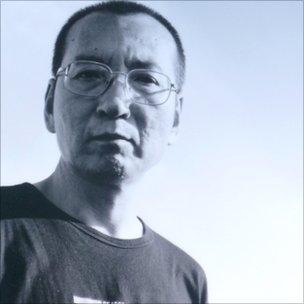Liu Xiaobo: 20 years of activism
- Published

The 54-year-old first came to public prominence in 1989, during the Tiananmen Square protests
In his time Liu Xiaobo has been a political activist, author, university professor and an annoyance to the Chinese Communist Party.
He was awarded the Nobel Peace Prize for standing up to the Chinese government and demanding political change - despite the government's fierce opposition.
Outside the country of his birth, he is known as one of China's leading dissidents, winning awards and the attention of the world's media.
But few people inside China have heard his name. He has repeatedly faced imprisonment and surveillance from the Chinese government.
He is currently serving an 11-year prison sentence for "subverting state power".
That charge came after he helped write a manifesto, called Charter 08, calling for political reforms.
Subverting state power?
The 54-year-old first came to public prominence in 1989, during the bloody suppression of protesters in Beijing's Tiananmen Square.
He returned home from the United States to take part in the demonstrations.
As soldiers moved to clear the square, Liu Xiaobo helped persuade some students to leave instead of facing down the army.
But that did not save him from the authorities. He was sent to prison for nearly two years.
"The massacre in 1989 made a very deep impression on me," he said in an interview he gave to the BBC just a few months before he was arrested in 2008.
The activist once worked as a professor at Beijing Normal University, although he was eventually banned from teaching.
In 1996 he was again put away for speaking out about China's one-party political system, but this time he was sent to a re-education-through-labour camp for three years.
It was while there that he got married to Liu Xia.
Since then he has continued to discuss a range of taboo subjects, including criticising China's treatment of Tibetans.
This has gained him respect, although some who know him say Liu Xiaobo was always a man who sought controversy.
His work brought him to the attention of those outside China who are trying to improve human rights in the communist party-ruled country, and he has received several prizes over the years.
At his trial in December last year the United States government felt compelled to speak out.
"We call on the Government of China to release [Liu Xiaobo] immediately and to respect the rights of all Chinese citizens to peacefully express their political views," read a statement from the US state department.
The document that got him into trouble, Charter 08, was released in December two years ago. It calls for a new constitution in China, an independent judiciary and freedom of expression.
It was backed by about 300 academics, artists, lawyers and activists, who want a fuller debate about China's future political development.
Two days before it was due to be published the police made a late-night raid on Mr Liu's home and took him away.
His wife said she could not initially find out what had happened to him because the authorities would not admit to taking him.
Monthly visits
It was not until nearly one month later that they finally confirmed they had arrested him.
He had a one-day trial in December last year and was sentenced to 11 years a few days later - on Christmas Day.
Some suspected the Chinese authorities had chosen that day because most people in the West would be on holiday, and not notice.
Before he was awarded the Nobel Peace Prize, Liu Xia used to visit her husband once a month at the prison where he is serving his sentence, in the city of Jinzhou, Liaoning Province.
They had hour-long meetings watched over by guards and security cameras.
She previously told the BBC: "Mentally and physically he's fine. He runs for an hour each day, he reads and he writes me letters."
As a wife, Liu Xia's greatest wish is for her husband to be released so he can come home to her.
But she believes his contribution to human rights will one day by recognised by a wider audience.
"Now his name is unknown [in China]. But one day, even if he's not regarded as a hero, he'll be thought of as a very good citizen."